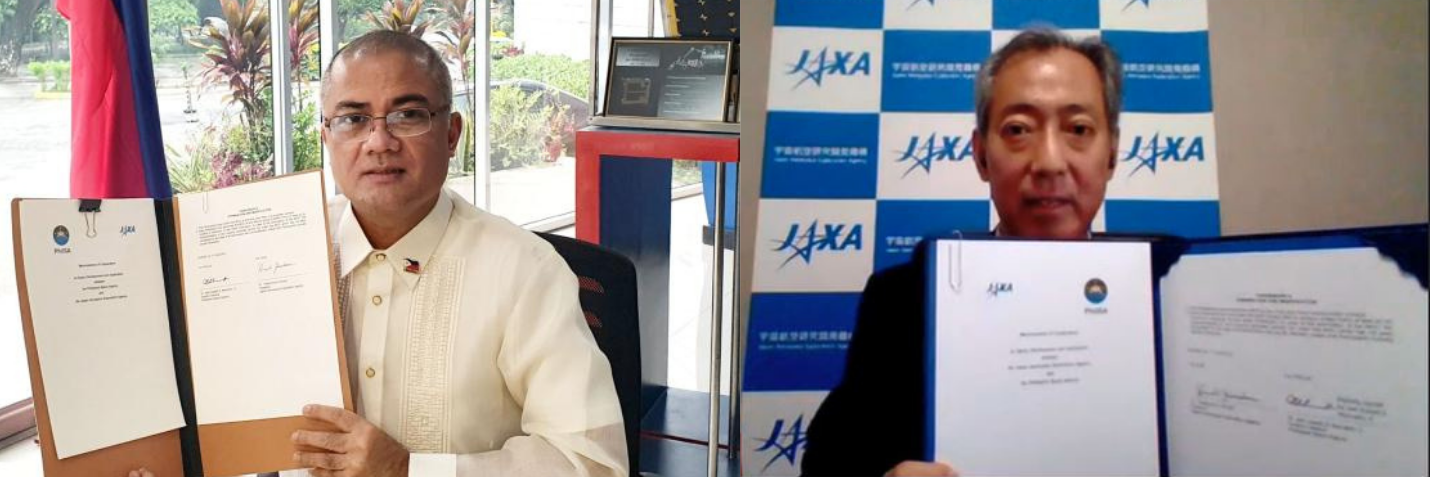(Quezon City, 11 June 2021) The Philippine Space Agency (PhilSA) signed a Memorandum of Cooperation (MOC) with the Japan Aerospace Exploration Agency (JAXA) on Friday in a virtual signing ceremony held simultaneously in Quezon City and Tokyo. The signing was led by PhilSA Director General Dr. Joel Marciano, Jr., and JAXA President Dr. YAMAKAWA Hiroshi.
The MOC seeks to explore opportunities for collaboration in the areas of: 1) Space Applications; 2) Satellite Development; 3) Space Environment Utilization; 4) Capacity building for space related technology development, space policy and legislation, 5) Space science and space exploration, and; 6) Promotion of space industry. With the support of the Department of Foreign Affairs (DFA), the agreement also defines procedures of collaboration based on peaceful and mutually beneficial uses of outer space.
“As we sign this agreement, we look back to what our country has been able to achieve in space over a relatively short period of time, and how Japan has contributed substantially to those efforts. Today, with JAXA, we look to further that cooperation as we continue to build forward, inspire, and open more opportunities for Filipinos to access and benefit from space,” Director General Marciano said.
He adds: “We bring to this cooperation our people and their experience from the Diwata and Maya satellites, along with our investments in ground infrastructure and capabilities for processing and analyzing spaceborne data. Together, we will create even more value from these activities and cascade them further to society.”
In his remarks, JAXA President Dr. YAMAKAWA said: “I’m very pleased to say JAXA is the first foreign space agency to sign a Memorandum of Cooperation with PhilSA. We understand that PhilSA is actively recruiting talented individuals and steadily building its organisation. As PhilSA begins its full-scale activities, we will be happy to work with you if our experience can be of any help.”
“Through our cooperation, JAXA hopes to jointly lead space activities in the Asia Pacific Region with PhilSA and contribute together with our space technology for socio economic development of the region,” Dr. YAMAKAWA adds.
Meanwhile, Philippine Ambassador to Japan H.E. Jose Castillo Laurel V also said: “This milestone event reinforces our feelings of renewal as we lay the foundations of a forward looking bilateral relationship in and beyond the 21st century. Space is already changing day by day in our lives and as the first country to sign an agreement with PhilSA, Japan will again be the transformative partner in our future.”
Ambassador Laurel witnessed the virtual ceremony along with Japan Ambassador to the Philippines H.E. KOSHIKAWA Kazuhiko, JAXA Vice President Mr. ISHII Yasuo, and JAXA Director for International Relations and Research Department Mr. SHOJI Yoshikazu. Also present at the event were members of the Philippine Space Council (PSC) led by Council Vice Chairperson Secretary Fortunato Dela Peña of the Department of Science and Technology (DOST).
JAXA has been a valuable partner of the Philippines in space science, technology and applications programs. The Philippines, through the DOST, collaborated with Japanese universities in the successful development and launch of the Philippines’ first microsatellites, DIWATA-1 and DIWATA-2, and nanosatellites MAYA-1 MAYA-2. Recently completed MAYA-3 and MAYA-4, the first Philippine university-built nanosatellites, were turned over to JAXA in April and are set to be launched this year.
Through the Asia Pacific Regional Space Agency Forum (APRSAF) and space cooperation activities like Sentinel Asia, JAXA has helped bring the benefits of space closer to our region. Founded in 2003, JAXA was formed through the merger of three institutions: the Institute of Space and Astronautical Science (ISAS); the National Aerospace Laboratory of Japan (NAL), and: the National Space Development Agency of Japan (NASDA). Designed to support Japan’s aerospace research and development, and utilization, JAXA envisions the use of space to achieve a safe and affluent society.
The Philippine Space Agency (PhilSA) was created by virtue of Republic Act 11363, “The Philippine Space Act”, which was enacted into law in 2019. As the central government agency addressing all national issues and activities related to space science and technology applications (SSTA), it is mandated to be the primary policy, planning, coordinating, implementing, and administrative entity of the Executive Branch of the government that will plan, develop, and promote the national space program. The agency is directly attached to the Office of the President, and facilitates the promulgation of executive and administrative orders and formulation of regulatory and legislative proposals on matters pertaining to SSTA development. PhilSA is headed by a Director General with the rank of a Cabinet Secretary, who also serves as the Presidential Adviser on Space Matters.
This is the second international agreement that the PhilSA has signed in two weeks. On Friday, 04 June 2021, PhilSA inked a cooperation deal with the United Nations Office for Outer Space Affairs (UNOOSA) for stronger collaboration on the use of space-based information for socio-economic development and attainment of the Sustainable Development Goals.
-30-



